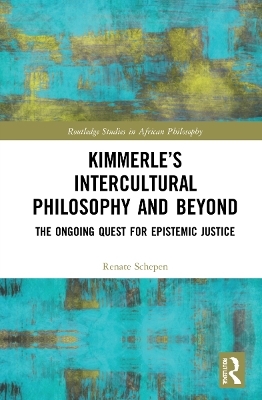
Kimmerle’s Intercultural Philosophy and Beyond
Routledge (Verlag)
978-1-032-22129-8 (ISBN)
This book offers a concise overview of the development of intercultural philosophy since the early 1990s, focusing on one of its key pioneers Heinz Kimmerle (1930– 2016).
Building on influences from Gadamer, Heidegger, Derrida and Ramose, Kimmerle’s approach to intercultural philosophy is radical and fosters epistemic justice. Kimmerle critically reflected on his own western philosophical tradition, highlighting the problems of a discourse based on a dominant concept of rationality, and of excluding different approaches and participants. Instead, Kimmerle developed an alternative way of thinking, emphasizing the importance Of recognizing philosophies of different cultures. He focused particularly on African philosophies in academic discourse. In the book, the many layers of Kimmerle’s intercultural philosophy are revealed, exploring how dialectics, hermeneutics, deconstruction and decolonization can contribute to epistemic justice. The author goes beyond Kimmerle and demonstrates how Kimmerle’s approach can be further enhanced by using an intersectional approach and by engaging in dialogue with female philosophers and artists.
This new study, which also introduces unpublished and untranslated texts from Kimmerle’s work in German and Dutch, will be of considerable interest to researchers of continental philosophy, intercultural and African philosophy, political philosophy, decolonial and feminist studies.
Renate Schepen is an independent philosopher. Her research focuses on intercultural philosophy and dialogues, and she contributes to the academic, public and private sectors with advice, research, education and publications. She has published/ edited books on intercultural philosophy, dialogue and diversity. Together with Heinz Kimmerle she published Philosophy of Understanding. A Dialogue ( Filosofi e van het verstaan. Een dialoog ) (2014). She completed her PhD (with honours) at the University of Vienna after studying philosophy at universities in Uruguay, Ghana and the Netherlands. More about her and her work can be found at: www.doordacht.net.
Prelude: Where We Are Coming From 1 Introduction: Epistemological Diversity as a New Paradigm Part I Confluence of Layers in Kimmerle’s Philosophy 2 Dialectics and Difference: Hegel, Heidegger, Derrida, Lyotard and Irigaray 3 Hermeneutics and Deconstruction: Schleiermacher, Hegel, Gadamer and Derrida 4 Deconstruction and Decolonization 5 Conclusion Part I Part II Dialogues and Epistemic Justice 6 Dialogues as a Form of Intercultural Philosophy 7 Dialogues and Decolonization: Conditions and Skills for Dialogue 8 Dialogues between Art and Philosophy: Playful Encounters Part III And Beyond Chapter 10 Imagining Epistemic Justice in Education and Ecology Appendix 1 ‘What does Derrida Mean by >Theology of Translation
| Erscheinungsdatum | 17.08.2022 |
|---|---|
| Reihe/Serie | Routledge Studies in African Philosophy |
| Zusatzinfo | 3 Line drawings, black and white; 4 Halftones, black and white; 7 Illustrations, black and white |
| Verlagsort | London |
| Sprache | englisch |
| Maße | 156 x 234 mm |
| Gewicht | 453 g |
| Themenwelt | Geisteswissenschaften ► Philosophie ► Erkenntnistheorie / Wissenschaftstheorie |
| Geisteswissenschaften ► Philosophie ► Ethik | |
| Naturwissenschaften ► Geowissenschaften ► Geografie / Kartografie | |
| Sozialwissenschaften ► Ethnologie | |
| Sozialwissenschaften ► Kommunikation / Medien ► Kommunikationswissenschaft | |
| Sozialwissenschaften ► Soziologie ► Spezielle Soziologien | |
| ISBN-10 | 1-032-22129-1 / 1032221291 |
| ISBN-13 | 978-1-032-22129-8 / 9781032221298 |
| Zustand | Neuware |
| Informationen gemäß Produktsicherheitsverordnung (GPSR) | |
| Haben Sie eine Frage zum Produkt? |
aus dem Bereich

![Was heißt Denken?. Vorlesung Wintersemester 1951/52. [Was bedeutet das alles?] - Martin Heidegger](/media/113619842)
